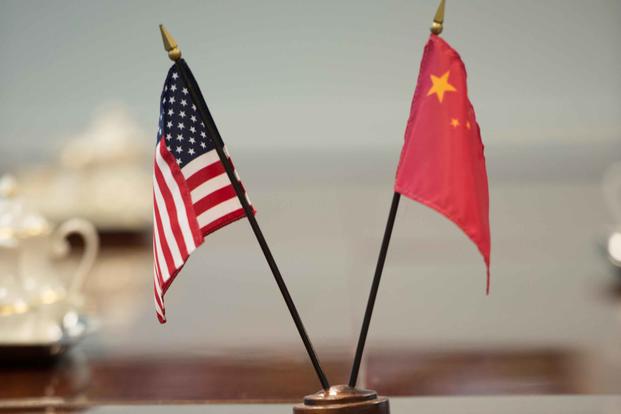Even before the coronavirus swept the planet, claiming the lives of over 280,000 people and infecting another 4 million worldwide, the U.S. and China treated one another with an overriding aura of suspicion and competition. The 2018 U.S. National Defense Strategy, the Defense Department's policy blueprint, labeled China a "revisionist" power. Beijing's military modernization has proceeded with the U.S. very much in mind.
China's early missteps in containing the virus, however, have turned relations between the two largest economies from competitive to downright adversarial in a short four months. Those in the Beltway who believe the U.S. would succeed in an environment where intensive rivalry dominate the U.S.-China relationship in every domain dangerously overestimate Washington's power, underestimate Beijing's capacity to retaliate, and callously dismiss the financial, geopolitical, and diplomatic costs such a rivalry would wreak on both the U.S. and the world.
Unfortunately, Washington has yet to prove it is willing or even able to see beyond the current cycle of noise and bombast. U.S. and Chinese officials are using the coronavirus crisis as a cudgel in an antagonistic, geopolitical clash-of-wills -- this, when a pandemic should be bringing the intellectual and scientific communities of the two powers together in search of effective treatments and a vaccine.
Indeed, with the coronavirus generating harsh reactions in Washington and Beijing and a veritable war of words between senior officials in both countries, a complete decoupling -- which would upend the global economy, causing more turmoil in the U.S. labor market -- is no longer inconceivable. In fact, discussions about China in Washington are no longer prefaced on begrudging but necessary cooperation, but within the prism of an ideological struggle that will define winners and losers in the 21st century.
The one denominator that provided the U.S. and China with a reason to preserve constructive dialogue with one another -- a $550 billion trade relationship -- is now a main arena for bilateral competition. The Phase One trade deal signed between the Trump and Xi administrations is skating on thin-ice, with new trade talks postponed for the foreseeable future. Chinese companies are being barred by the Trump administration from U.S. telecommunications infrastructure at the same time Beijing is expelling American journalists. According to the Wall Street Journal, the State Department has ordered embassies around the world to form China-centric working groups to monitor Beijing's influence and develop strategies to counteract it. U.S. and Chinese delegations are clashing with greater frequency in international fora, throwing sand in the U.N. Security Council's gears and complicating the work of the very organizations that are vital to stemming the virus.
The frostiness between the U.S. and Chinese governments is devolving to the American and Chinese populations as well, making pragmatic engagement more complicated. 66 percent of Americans have an unfavorable view of China, while Chinese approval ratings of the U.S. have decreased by nearly 20 percentage points between 2019 and 2020. On the U.S. side, relations U.S. with China are in effect trapped in a vicious cycle: the more the U.S. foreign policy elite views China in exclusively hostile terms, the more likely reflexive anti-China sentiment will grow among the American public. The more this hardline sentiment against China rises in U.S. popular opinion, the harder it will be for U.S. officials to argue effectively for a China strategy based on realism and restraint. The "new Cold War" narrative is in effect becoming a dangerous self-fulfilling prophecy.
Does China have a responsibility to come clean to the world about how it has handled the virus? Most certainly. Should there be some accountability levied on Beijing for the Chinese Communist Party's disinformation campaign and resistance to global assistance? One would have trouble finding anybody in the U.S. today who would disagree.
None of this, however, makes the idea of a U.S.-China economic rupture or a Cold War-style containment policy any less of a terrible idea. It is difficult to envision legitimate U.S. complaints such as unfavorable Chinese trading practices, intellectual property theft, and cyberattacks against U.S. infrastructure being addressed, let alone solved, in such an atmosphere
We live in an extremely emotional time. Americans are scared, frustrated, and angry as tens of thousands of their fellow citizens have died and more than 30 million others are rendered jobless in just six weeks.
Yet it is precisely when emotions are running high when cool-headedness is most needed. There have been countless times in U.S. history -- the 2003 war in Iraq; the 2011 NATO intervention in Libya; the 2015 U.S. support for Saudi Arabia's military campaign in Yemen; nation-building in Afghanistan -- when decisions prefaced on hubris, arrogance, fear, or poor assumptions have cost the United States tremendous human and financial pain for little security benefit.
Cancelling U.S. debt to China or suing the Chinese Communist Party for compensation are emotional responses that will do nothing to manage the outbreak or rebuild Washington's bilateral relationship with Beijing once the crisis is over. As the U.S. foreign policy establishment debates China policy, it should keep in mind the golden-rule: good statecraft requires a calm, measured approach.
-- The opinions expressed in this op-ed are those of the author and do not necessarily reflect the views of Military.com. If you would like to submit your own commentary, please send your article to opinions@military.com for consideration.

No comments:
Post a Comment